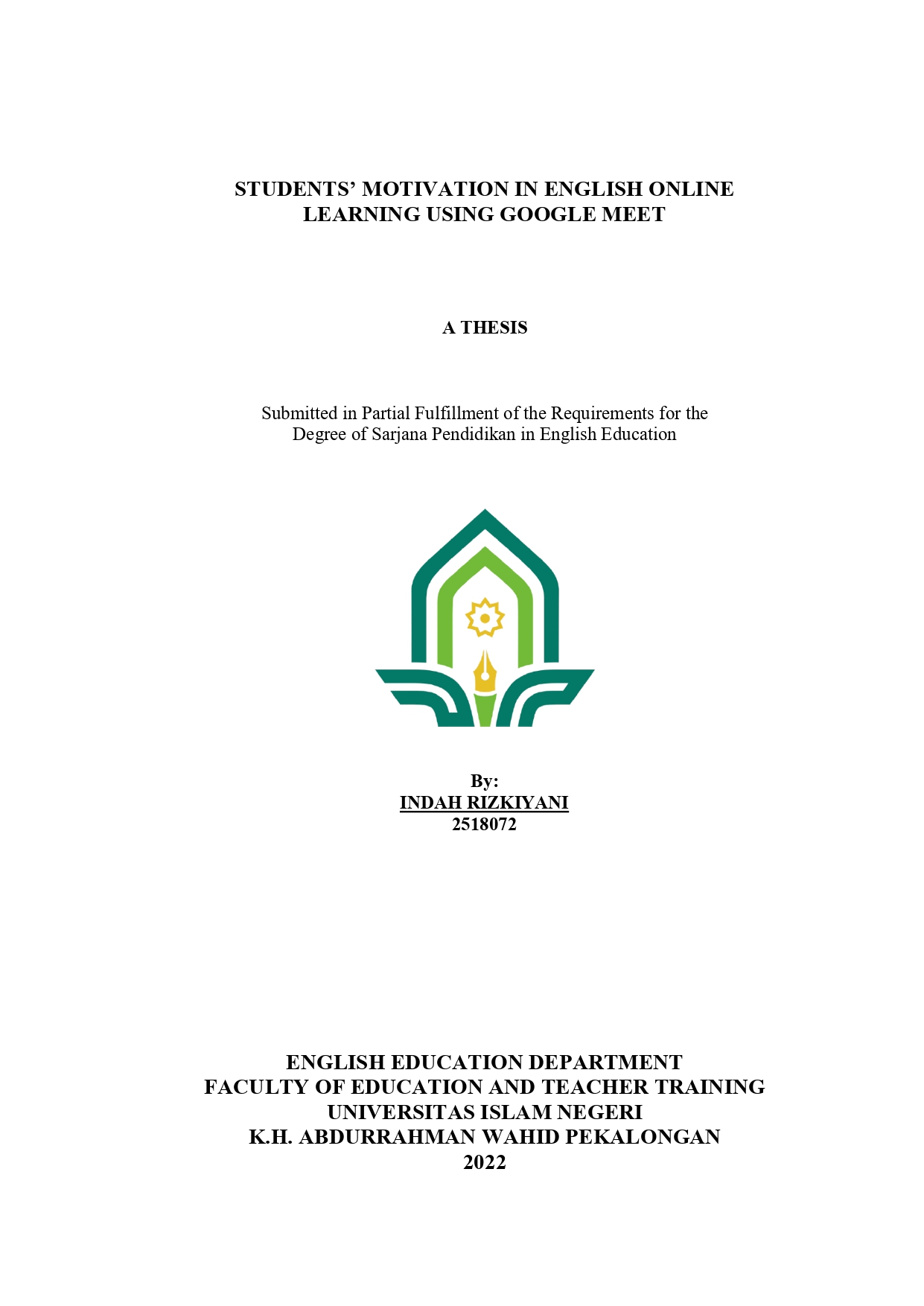
SKRIPSI TADRIS BAHASA INGGRIS
Students' Motivation in English Online Learning Using Google Meet
Corona Virus that happened in 2019 has changed the entire human life activity around the world, including educational activity in Indonesia. The face-to-face learning system has been turned into an online learning system. Regardless of the Covid-19 Pandemic, students have to be adopted several digital learning media to face the industrial revolution era. The learning media such as Google Meet was implemented to support the online learning system. This study explained the use of Google Meet related to the students’ motivation in learning English through Google Meet during the pandemic. There were six undergraduate students who participated in this research. The researcher used a qualitative approach with the semi-structured interview as the data collection method. Miles & Huberman data analysis method was applied in this study. Abdul Rahman’s, Harmer’s, and Hamzah B.Uno’s theories related to the Google Meet application and the students’ motivation were applied in this study. The findings of this study were there were several factors of the Google Meet application affected the students’ motivation during the English online learning process through Google Meet, such as the features, the advantages, and the disadvantages. In addition, Google Meet a bit motivated students in English online learning. Furthermore, Google Meet helped the students to improve their listening and reading skills contrast,-; it limited in writing and speaking skills.
Keywords: Google Meet, Motivation, English Online Learning
REFERENCES
Afief Fakhruddin. (2019). Using Google Meet In Teaching Speaking. Journal of English Language Learning (JELL), 2(2), 43–46.
Al-Maroof, Rana Saeed Said A. Salloum, Aboul Ella Hassanien & Khaled Shaalan. (2020). Fear from COVID-19 and technology adoption: the impact of Google Meet during Coronavirus pandemic. Interactive Learning Environments, DOI: 10.1080/10494820.2020.1830121
Awalia, I., Rohimajaya, N., & Sudirman, A. (2021). An Analysis of Google Meet Usage in Teaching and Learning Activities at Senior High School Level during Pandemic Covid-19. PROCEEDING AISELT (Annual International Seminar on English Language Teaching), 6(1), 56- 66.
Bachri, Bachtiar S. (2010). Meyakinkan Validitas Data Melalui Triangulasi Pada Penelitian Kualitatif. Jurnal Teknologi Pendidikan, Vol. 10 No. 1 (46-62)
Benson, P., Barkhuizen, G., & Chik, A. (2014). Narrative inquiry in language teaching and learning research. New York: Routledge.
Braun, V. & Victoria C. (2006). Using Thematic Analysis In Psychology, Qualitative Research In Pshychology, 3:2, 77-101. https//doi.org/10.1191/1478088706qp063oa
Carrillo, Carmen & Maria Assunção Flores. (2020). COVID-19 and teacher education: a literature review of online teaching and learning practices. European Journal of Teacher Education, 43:4, 466-487. DOI: 10.1080/02619768.2020.1821184
Clandinin, D., & Caine, V. (2008). Narrative Inquiry. In Lisa M. Given (Ed.), The Sage Encyclopedia of Qualitative Research Methods. (pp. 542-545). Thousand Oaks, CA: SAGE Publications, Inc. doi: http://dx.doi.org/10.4135/9781412963909.n275
Harmer, Jeremy. (2007). How To Teach English Second Edition. Edinburgh Gate: Pearson Education Limited.
Islamuddin, Haryu. (2012). Psikologi Pendidikan. Yoyakarta: Pustaka Pelajar.
Katherine A. Karl, Joy V. Peluchette, Navid Aghakhani. (2021). Virtual Work Meetings During the COVID-19 Pandemic: The Good, Bad, and Ugly. https://doi.org/10.1177%2F10464964211015286
Ketersediaan
| 23SK2325049.00 | SK TI 23.049 IND s | My Library (Lantai 3. Local Content) | Tersedia |
Informasi Detail
- Judul Seri
-
-
- No. Panggil
-
SK TI 23.049 IND s
- Penerbit
- Pekalongan : Jurusan S-1 Tadris Bahasa Inggris FTIK UIN K.H. Abdurrahman Wahid Pekalongan., 2022
- Deskripsi Fisik
-
xiii, 42 hlm., 30 cm; Bibliografi: 43-45
- Bahasa
-
Inggris
- ISBN/ISSN
-
-
- Klasifikasi
-
371. 35
- Tipe Isi
-
-
- Tipe Media
-
-
- Tipe Pembawa
-
-
- Edisi
-
-
- Subjek
- Info Detail Spesifik
-
-
- Pernyataan Tanggungjawab
-
Indah Rizkiyani (2518072)
Versi lain/terkait
Tidak tersedia versi lain
Lampiran Berkas
Komentar
Anda harus login sebelum memberikan komentar
 Karya Umum
Karya Umum  Filsafat
Filsafat  Agama
Agama  Ilmu-ilmu Sosial
Ilmu-ilmu Sosial  Bahasa
Bahasa  Ilmu-ilmu Murni
Ilmu-ilmu Murni  Ilmu-ilmu Terapan
Ilmu-ilmu Terapan  Kesenian, Hiburan, dan Olahraga
Kesenian, Hiburan, dan Olahraga  Kesusastraan
Kesusastraan  Geografi dan Sejarah
Geografi dan Sejarah